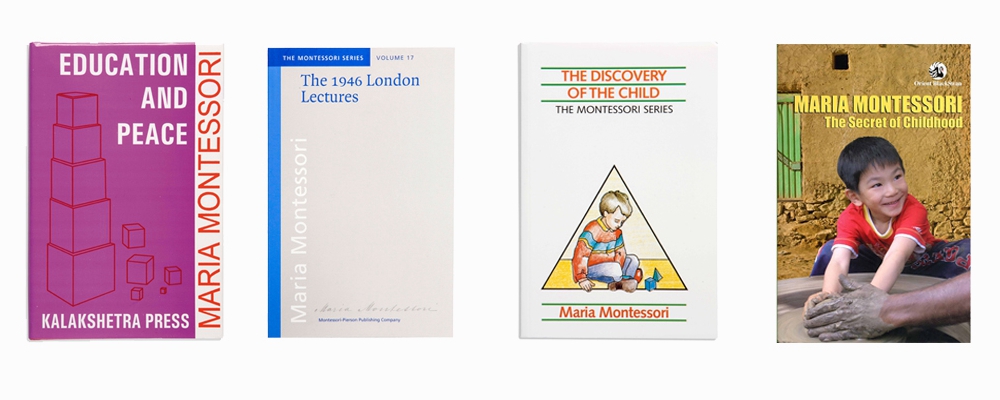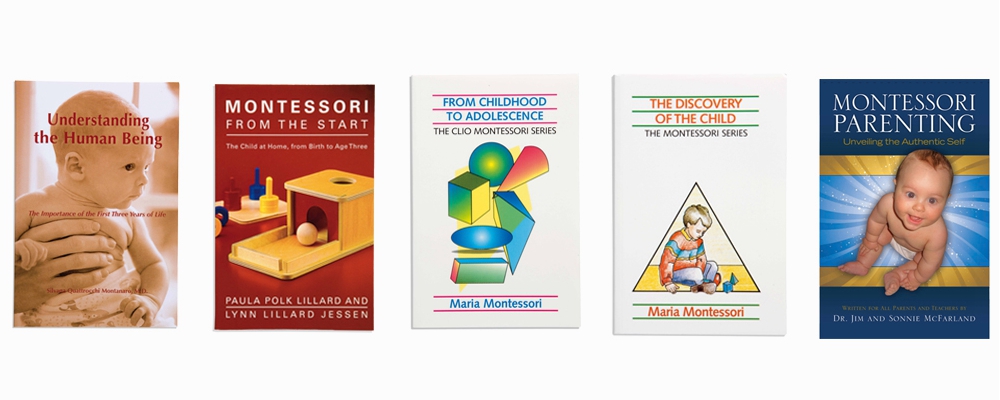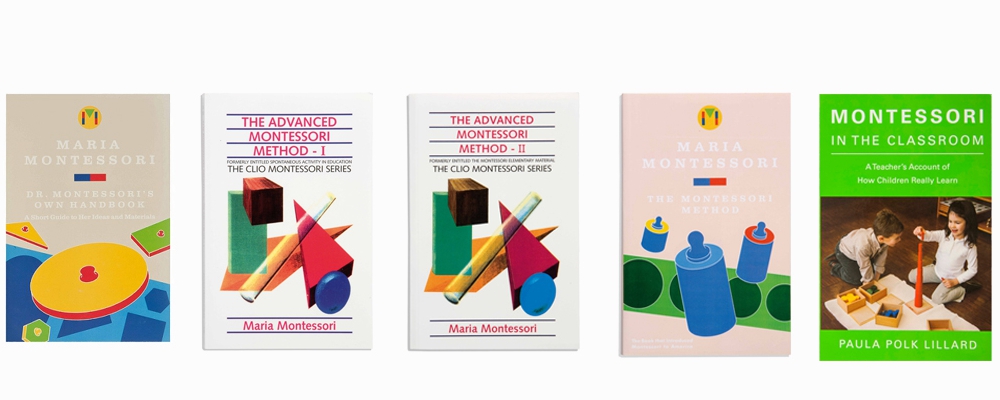Montessori Book List

Written by Maria Montessori
Education And Peace:
A collection of Maria's lectures as she comes to grips with the great problem of the future of humanity, in which she gives passionate expression to her insights on the subject of "Educate for Peace" between World War I and World War II.
The 1946 London Lectures:
The 1946 London course was the first training course given in Europe by Maria Montessori when she and her son Mario returned from seven years of exile in India during World War II. The typescript of this course was to have significant pedagogical consequences, since The 1946 Lectures became the foundation of AMI’s 3-6 courses.
The Discovery of the Child (Clio):
First published in 1948, this book lucidly delineates the fundamental principles of the Montessori approach to education, which was based on a series of genuine discoveries of Dr. Maria Montessori. The application of these principles, transcends boundaries of class, culture or creed, and is relevant to the whole of human development.
The Secret of Childhood:
This book is divided in three sections, dealing in turn with early childhood development, the author’s educational method, and the relation of the child to society. First, Montessori talks about the new-born child who is not only a body ready to function as a body, but also has a spiritual embryo with latent psychic capacities. The second part of the book gives an account of the first Casa dei Bambini about the essence of the Montessori Method. The adult should be determined to learn from the children rather than to force their own ideas on them. The essence of the Montessori Method lies in: observing, helping, presenting, rather than teaching or forcing. The adult, Montessori claims, must play a low-key role; all is free and open for the child, who chooses his own materials to work with, and learns from them because they interest him. Given the method of free choice of work and materials, the concentration is high and the need for punishment and reward is not necessary.

For Parents Reading
Understanding The Human Being:
Silvana Montanaro, MD. The importance of education in the first 3 years of life to reach a high level of emotional, intellectual and moral integration.
Montessori From The Start:
Paula Polk Lillard and Lynn Lillard Jessen. The authors provide parental guidance for the establishment of an environment to aid in the development of focus and concentration.
From Childhood To Adolescence (Clio):
This work follows the child from the age of 7 through adolescence. Dr. Montessori’s understanding of the adolescent’s need for independence in thought and action is remarkable. Her comments on the state of education and its implications for the world at large are very modern and more relevant today than ever before.
The Child in the Family:
In this book Dr. Montessori examines the tensions inherent in the relationship between the adult and the child. She discusses the difficulties and contradictions of daily life within the frame work of which adults need to recognize and rectify their own defects in order to become worthy of the child. She stresses the importance of the child’s environment and the role it plays in the building of the child’s character.
Montessori Parenting:
Sonnie McFarland. Montessori Parenting: Unveiling The Authentic Self is a must read for all parents and teachers of young children. The reader learns how to: Implement Montessori philosophy in the home, constructively respond to children’s behavior, be calm and confident with children, enhance children’s authentic nature, and much more.

For Teachers Reading
Dr. Montessori's Own Handbook:
Dr. Montessori’s notes as to the use and intent of Montessori curriculum tools.
The Advanced Montessori Method: Volume 1 (Clio):
This work on scientific pedagogy comes in two volumes. The first volume entitled Spontaneous Activity In Education begins with a survey of the inner and outer life of the child, and emphasizes the importance of the prepared environment in education. The second volume is entitled The Montessori Elementary Materials. The two volumes discuss the application of the Montessori principles in the education of older children between 7 and 11 years of age.
The Advanced Montessori Method : Volume 2 (Clio):
This work on scientific pedagogy comes in two volumes. The first volume entitled Spontaneous Activity In Education begins with a survey of the inner and outer life of the child, and emphasizes the importance of the prepared environment in education. The second volume is entitled The Montessori Elementary Materials. The two volumes discuss the application of the Montessori principles in the education of older children between 7 and 11 years of age.
The Montessori Method:
Theory and practice of the Casa Dei Bambini. Shows parents, teachers and administrators how to free a child to learn through his own efforts.
Psychogeometry:
Maria Montessori. ‘Psychogeometry’ demonstrates the originality and brilliance of Maria Montessori’s own mathematical talents. This, combined with her deep understanding of the psychological workings of the child’s mind, enabled her to offer an approach to mathematics that is irresistible and fascinating. Based on her Italian manuscript and the 1934 Spanish edition.



![[sort:parentname]](/static/upload/image/20200303/1583213707546914.jpg)
![[sort:parentname]](/static/upload/image/20200303/1583213768825649.jpg)
